from Outdoor America
Something Unusual
by Ellis Parker Butler
Year before last, when my friend Hetter was in England, the Duke of Mersey took him up into Scotland for some salmon fishing, so this year, when the Duke came to the United States, Hetter asked him up to his place to have some trout fishing. The Duke had been curious about rainbow trout, which he had never seen, and Hetter had bragged considerably about them, saying they broke water oftener and leaped higher out of water than any other trout, and the Duke had scoffed at that.
"You just come up to my place," Hetter said when he met the Duke in New York, "and I'll show you something unusual in trout fishing, or I'm a Hottentot," which, of course, he wasn't. So it was arranged that the Duke and the Duchess, and Lady Eleanor, their daughter, should go up, and Mrs. Hetter would be there. The Duchess was much interested in ferns, so Mrs. Hetter invited Professor Hinch, because he was the greatest fernist in the world, and young Clarence Hetter would be there to keep young Lady Eleanor amused.
Between you and me, young Clarry Hetter would amuse anyone. He is one of those useless sons of wealth, about thirty-six, and when he is going especially strong and just brimming over with intellectuality, he can actually say, "Ah, but I say, old chap!" without stuttering, but he usually says, "Ah, but I -- ah -- say -- ah -- old chap!" I never heard him say anything else -- not much else.
Hetter has a fair piece of brook -- Stone Brook -- and he has it posted so thoroughly that it looks as if it had been snowing white muslin warning signs all over the place, but most of the brook is not much good. It is too shallow; no place for good-sized trout to hide. The one really good pool he has -- and it is a dandy -- is one he calls the Fall Pool. There is a waterfall of some eight feet, and under that is one of the most beautiful pools you ever saw. There are usually some good trout in that pool; they come up to it from below and down to it from above; but they are mostly natives and browns. Hetter had promised the Duke some rainbows.
So Hetter telephoned up to his caretaker and asked how the rainbows were in the Fall Pool.
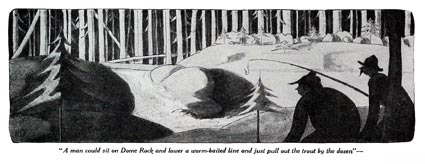
"Well, I'll tell you, Mr. Hetter," old Enos said, "the' just ain't any. I been watchin' that pool like a hawk, but a man can't be everywhere, and them miserable poachin' Gallups has been and ketched out the fish. Them Gallups or somebody has near cleaned out that pool."
"Help!" exclaimed Mr. Hetter, or something of nearly the same sound. "Say, listen, Enos -- I've got a duke coming up with me -- No, not a dude, a duke, and I promised him something unusual in trout fishing, and I've got to have some good rainbows in that pool. I'll telegraph right now to the hatchery for one hundred twelve-inch rainbows, and I'll be up to see them put in."
The time was mighty short, and he had to telegraph three hatcheries before he found the big rainbows, but the Gleason Hatchery promised him one hundred fine fat peppy fish, to be delivered right on the dot, and Hetter went up to see them put in. He had them all put in the pool. They were good fish and came in good condition.
There were just the three good estates along the brook -- Hetter's and those of his two neighbors, the Consolidated Building man Ruggles, and O'Hare, but the fellows in the village were the pests. In Hetter's opinion they were all poachers, and most of them were, especially the Gallup father and son. They were the ring-leaders, and Hetter was about right in saying that they considered the warning "No Trespass" signs mere advertisements and requests to come and fish. Quite a few people think as Hetter did; sometimes you can leave a brook alone and, maybe, two or three will come and fish it, but a "No Fishing" sign reminds everyone that he has not had a day's fishing in a wad of years, and presently the poachers are so thick on the stream they step on each other. They've been reminded and dared, and they take the dare.
However that may be, the time the poachers up Hetter's way got in their meanest work was just after a good lot of hatchery trout had been put in the brook. The hatchery trucks had to drive through the village, and that was all the notice Ed Gallup and his son needed; they went right out and dug bait, and that night they sat on the Dome Rock and fished Hetter's Fall Pool like pups eating noodles. It was fish-murder, no less. I have heard old Enos estimate that if you put one hundred trout in that pool in the afternoon, eighty-five would be in Ed and Joe Gallup's baskets before morning.
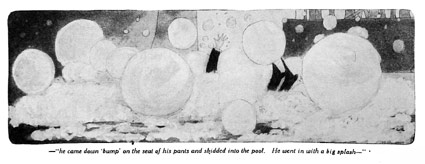
This is all an ancient tale to anybody who has posted water and stocks fish into it, and it was an old tale to Hetter, but he had to have rainbows in that pool for the Duke to catch. Old Enos swore he would be vigilant, but Hetter had to go down to New York to come up with the Duke's party, and he had not too much faith in a rheumatic old codger like Enos. He might sit up to guard the pool and he might not; he might try to drive the two husky Gallups away if they appeared, and he might not.
So Hetter studied the thing out and he hit on a plan.
"Enos," he asked, "did your wife make a barrel of soft-soap this spring?"
"Yes, Mr. Hetter, she did so, like always," Enos told him.
"Well, I want some of it; three or four pails of it, anyway. And have you got a white-wash brush?"
"A sort of one; 'tain't so good as it was once --"
"It'll do. You go up to the house and get two pails of soft-soap and that brush, and you bring them down through the woods, and don't you say anything about it to anybody."
So Enos went up to the house.
The Fall Pool, where Hetter had put all the big rainbows, was in a sort of gorge. On the far side the wall of the gorge was high and perpendicular, but at the base of the wall was a good gravel beach, and that was the only place where the pool could be fished with a fly. The water eddied there -- a big circular eddy -- but you could cast beyond the eddy into the part of the pool where the fish lay. Above the pool were the falls; below it the stream dropped so rapidly down the rocks that a man stood too low to cast.
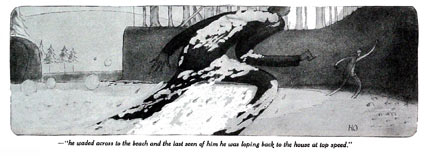
On the near side of the pool there was this Dome Rock. It sloped up from the pool to a rounded top. On one side the perpendicular wall of the gorge was repeated; on the other side you could not get near the brook at all. It was from this Dome Rock that all the poaching was done. A man could sit on it and lower a worm-baited line and just pull out the trout by the dozen; from below or above or across the pool worm-fishing was impossible. Below Dome Rock the pool was five feet deep -- good water, with the current running through it, just the place for trout to lie.
Hetter went out to the edge of Dome Rock and spilled soft-soap down it. Then, with the brush -- backing away as he sloshed on the soap -- he covered the top of the rock. Old Enos watched him and, when Hetter straightened up, stepped onto the rock and said, "Here's one place you didn't --" and that was as far as he got. When he stepped onto the soapy rock his feet went up, and he came down "bump" on the seat of his pants and skidded down the rock into the pool. He went in with a big splash, and gave one yell and waded across to the beach on the other side, and the last Hetter saw of him just then he was going back to the house as fast as he could lope.
That pleased Hetter mightily; he knew that nobody would remain on that rock very long, and he was right. He went back to the city and that night old Gallup and his son sneaked up to poach the Fall Pool. They sneaked through the bushes to Dome Rock, and old Ed Gallup stepped onto the rock and his feet went up, and he skidded down the rock on his back, into the pool. Joe Gallup was right behind him. He landed with his legs a-straddle of the old skeesick's neck, and when they got untangled they clawed their way across to the beach and scooted for home as fast as they could scoot.
That was about midnight, and it seems that toward one o'clock in the morning Hetter's neighbor O'Hare and his party were just getting warmed up. O'Hare had three or four friends up to fish his brook, but they were amateurs and had had no luck at all, and Ruggles was with them, and they were destroying highballs by the dozen and singing "Sweet Adeline," when Ruggles had an idea.
"I tell you, fellows," he said. "Lesh go fish'n'. Lesh go gesh some worms an' poash on ol' Hetter. Kesh losh fish with worms on ol' Hetter."
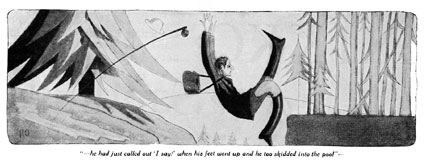
That seemed a good idea, so O'Hare called his man Carney, and Carney went out to dig worms, and the whole gang struggled into boots and coats, and about two o'clock in the morning Ruggles was leading the way to Dome Rock, saying "Kawshush, fellers; got to be kawshush! Jush foller me, but be kawshush!" It was a great lark, poaching on good old Hetter, with worms.
"Thish way, fellers!" Ruggles said, and he stepped on the soaped rock and disappeared. O'Hare pushed the bushes aside and stepped on the soaped rock and said something in Gaelic, and disappeared. As nearly as I have been able to get the names, the others who pushed through the bushes, threw up their feet, yelped with surprise, and skidded down the rock on their backs and into the pool went Mr. Farnsworth, Mr. Pelky, General Yountz, Mr. Gale, Mr. Connors and Mr. Gaspari. They went home sober -- wet and sober -- and when O'Hare's man Carney arrived with the worms he heard no one, so he stepped out onto Dome Rock, and his feet went up, and he bumped on the rock, and he skidded into the pool, and he went home wet. He did not need the ducking to sober him; he was sober to begin with.
The next day Hetter drove up with the Duke and the rest of the party, and they reached Hetter's place about luncheon time. After lunch Hetter and the Duke got into their fishing togs and took their rods and creels and landing-nets, and Hetter led the Duke to the brook. They started in just in front of the house.
"We'll fish down to my pool," Hetter told the Duke, "I don't get much out of the brook along here; I just want you to see it, but when we get down to my pool I can promise you, I think, something unusual."
So they fished along down and, up at the house, Mrs. Hetter and the Duchess and Lady Eleanor put on walking shoes, and with Professor Hinch, they started out to see what ferns could be seen. On the way Mrs. Hetter mentioned what a pretty falls they had on the brook, and the Duchess said, "Aw, railly! Ah'd quaite laike t' see it, ya knaw!" and so Mrs. Hetter led the way.
"There's a fine view of the falls from a rock we call the Dome Rock," she said. "If you will just come this way --"
So she led the way through the bushes, following the wandering path, and before she pushed the bushes aside to step onto Dome Rock she said she would just look to see if Mr. Hetter and the Duke were fishing the pool. She went through the bushes and stepped on the rock, and you can imagine what happened to her. As she went down she uttered one scream, and the gallant Professor pushed the bushes aside and up went his feet and down he went, and the Duchess said to Lady Eleanor:
"Railly! How peculiah! Ah do not fawncy bein' left here aloane, El'noh!" and she and Lady Eleanor pushed aside the bushes and instantly threw their arms around each other, and chucked their four feet into the air and went into the pool, if we may say so, on their aristocratic necks.
Now what I have thus far told you may doubt to be the exact truth, because I have told it so hastily, but what follows will be recognized as absolute truth by any fisherman, because we fishermen know the truth when it is told plainly and simply. It seems that young Clarence Hetter had not started out with Mrs. Hetter and the Duchess and Lady Eleanor because he was not ready. He told his mother he would meet the ferning party at Dome Rock.
However that may be, the Duchess and Lady Eleanor and Mrs. Hetter and the Professor struggled out of the pool and across to the beach, and hurried for home, and the Duchess certainly did look ruined. Generally speaking, it does a Duchess no good to souse her around in a pool.
So, presently, all being quiet on Stone Brook, Mr. Hetter and the Duke worked down, not having much fortune, and Mr. Hetter led the way to the descent into the gorge, and up to the pool on the beach side of the pool, with the Duke close at his heels, and there Mr. Hetter stopped short and simply stared with his mouth open. At first he could not believe his eyes.
You have, of course, guessed what had happened. From the little beach the pool could not be seen at all. Between Mr. Hetter and the Duke, and the part of the pool under Dome Rock, was a huge white fluffy hill of foam. It was soap-suds.
"I say, what!" exclaimed the Duke. "Amazin', what?"
He did not know what that huge floating island of foam meant, but the fact is that every time one of the skidders skidded down Dome Rock he -- or she -- took along a lot of the soft-soap and, churning around in the pool, beat it up into foam and suds.
Well, Mr. Hetter was absolutely disgusted. He opened his mouth to explain how disgusted he was, but just then Clarence appeared at the top of Dome Rock and he had just called out "I say!" when his feet went up and down he skidded.
I don't know whether it was Clarence's outfit that scared that rainbow trout, or whether it had just got tired of being socked on the head by people who shot down Dome Rock, but when Clarence hit the water a twelve-inch rainbow leaped out of the pool, up over the eight-foot mountain of soap-suds, and slammed against the Duke's chest with a sort of hollow thump. Instantly the Duke grasped it and the next moment it was in his creel.
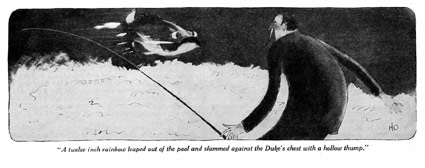
"I say!" he exclaimed. "Extrawdnry, what? You Amur'cans are really amazin'!"
"I said I'd show you something unusual." Hetter said, with great presence of mind.
If you doubt this you can read it yourself in the Duke's book, "Reminiscences of a Duke." chapter XXI, page 453, where he tells the whole story under the chapter title of "American Fishing Customs." He has the rainbow mounted on a birch slab, hanging in the ducal castle.
So if anyone tells you a rainbow always breaks water twice, you can tell him this one leaped only once -- but it was a mighty good leap.